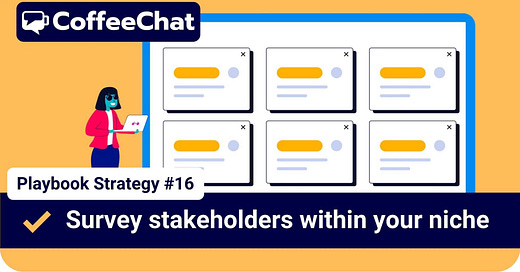Weekly Coach Spotlight
This week we spotlight Louise, a Productivity Coach based in Johannesburg, South Africa. Read the full spotlight article to learn more about her approach to coaching. Here’s what she shared about her experience training to become a coach:
My biggest key learning was that I don’t have to have the answers for my clients, but rather focus on supplying a supportive and nurturing environment, for them to uncover and discover their own solutions.
Survey Stakeholders Within Your Niche
In our weekly playbook preview tip for coaches, we cover another topic that within the theme of “Build & Monitor Your Niche”:
Even if you are already a top coach or expert, the sector and clients that encompass your defined niche is constantly evolving. There are a number of ways, both passive and active, to stay on top of trends. One proactive way to identify new insights is to survey people. Your survey should aim to reveal a trend or observation about your niche that isn't necessarily obvious or common knowledge, in which you would be well positioned to coach or advise current or prospective clients on. You should treat a survey differently from an in-take form or assessment, as those have different objectives in mind that will determine which questions to include. Ultimately, running occasional surveys on specific and relevant topics can help you position yourself as a curious and humble thought leader.
Say that you are a coach who works specifically with managers of sales teams. You have years of experience as a sales manager yourself, and coach a number of sales team managers on a regular basis. During a coaching call, a sales manager shares with you that she is worried that she is checking in 1-on-1 with her team members too frequently. As a coach, this reflection allows you to ask further questions to help the manager determine if her worry is warranted or not, and how to investigate further into whether to adjust her check-in frequency and style, and how best to engage her team members around the same concern. After the call, you note down that "how often do you check in 1-on-1 with each team member" was an effective coaching conversation starter. You also realize that you yourself have a new blindspot in that you haven't thought enough about how check-in frequency has been impacted by work-from-home trends since you no longer manage a sales team yourself. This is a great opportunity for a rapid survey. Had you already had this information, you could have added more context and value to your coaching support by referencing your findings (e.g. "a majority of sales managers run 1-on-1 check-ins twice per week, but there are also some successful sales managers that run them daily") while assuring her that its up to her and her team to craft the best approach.
Surveys can take shape in a number of ways. Here are some quick notes on making sure that you follow survey best practices:
Keep it short, even just 1-2 questions if possible! If you must go longer than 3-5 questions, give an option to answer the additional questions if they are interested or fit into the profile of your target profile based on their initial questions.
Use tools that respondents will be comfortable using such as a LinkedIn poll, Google form, Survey Monkey, Jotform, etc.
Obtain consent for using their response data by including check boxes at the beginning or end of the survey. Separately offer them an opportunity to sign up for a newsletter if you have one, but don't make it compulsory.
Only ask for qualifying information when it is critical to analyzing your results. And if you do, you'll probably want to make the respondents anonymous.
Ask the respondent if they are ok if you follow up with them for a short 20-minute call to discuss further. You can either include this as a check box in the survey itself if you are interested in speaking with any of your respondents, or you can pick specific respondents based on if your find their responses of interest to dig further - and reach out over email to see if they'd be open to having a quick follow-up call.
To incentivize participation, promise to share a summary of the results with respondents.




